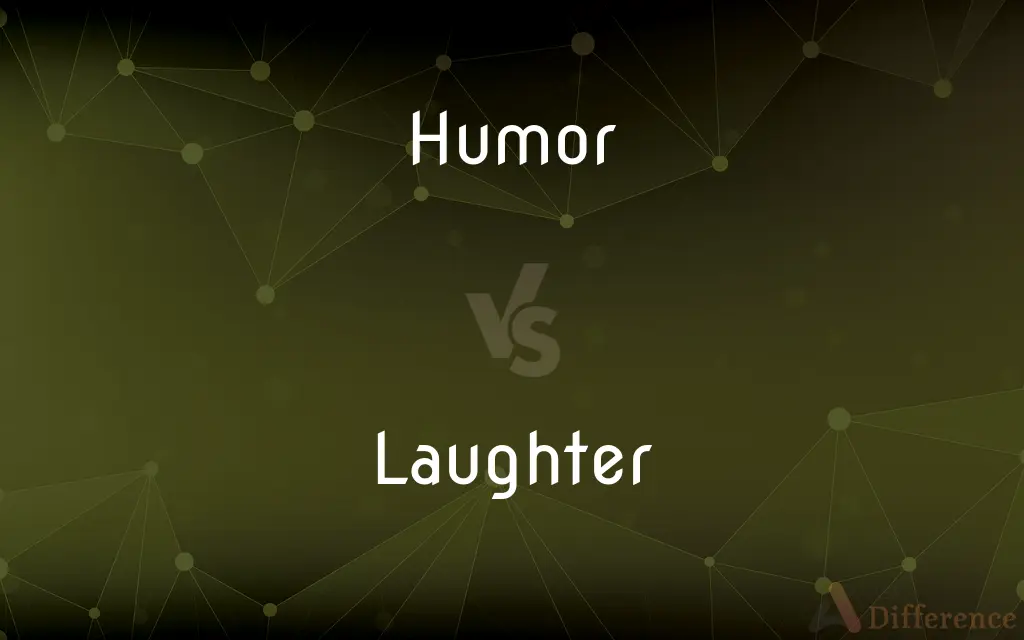Humor vs. Laughter — What's the Difference?
By Urooj Arif & Fiza Rafique — Updated on April 9, 2024
Humor is the quality of being amusing or funny, while laughter is the physical expression of amusement.

Difference Between Humor and Laughter
Table of Contents
ADVERTISEMENT
Key Differences
Humor is the ability to perceive, enjoy, or express what is amusing or comical, whereas laughter is the audible expression or appearance of merriment or happiness. Humor often requires a cognitive response to appreciate the joke or funny situation, while laughter is a physical reaction that can be spontaneous and uncontrollable.
Humor is subjective and varies widely among individuals, cultures, and situations, often influenced by personal experiences, cultural background, and social contexts. On the other hand, laughter is a universal human sound that serves as a social signal, understood across different cultures and languages, indicating amusement, relief, or bonding.
While humor can exist without laughter, as in the appreciation of dry or subtle wit, laughter almost always follows from some form of humor, whether it is explicit jokes, humorous situations, or the joy of being in good company. However, laughter can also be a response to tickling, nervousness, or even social discomfort, not just humor.
Humor often involves creativity and intelligence to create or understand jokes, puns, satire, or irony, appealing to the intellect as well as emotions. Laughter, in contrast, is a physical response that can relieve stress, improve mood, and even enhance immune function, demonstrating the beneficial health effects of humor and laughter.
Humor and laughter are deeply interconnected, with humor often serving as a trigger for laughter and laughter enhancing the enjoyment and sharing of humor. However, the appreciation of humor is a mental process that involves understanding, interpretation, and emotional reaction, while laughter is a physical manifestation of this enjoyment or amusement.
ADVERTISEMENT
Comparison Chart
Definition
The quality of being amusing, or the ability to express or perceive what's funny.
The act or sound of laughing, indicating amusement.
Nature
Cognitive and emotional, varies widely among individuals.
Physical and universal reaction to humor or joy.
Trigger
Intellectual or emotional response to comical stimuli.
Often a spontaneous physical reaction to humor or tickling.
Purpose
To entertain, provoke thought, or convey messages subtly.
To express joy, relieve stress, and foster social bonds.
Cultural Aspect
Varies significantly across different cultures and contexts.
Generally understood and shared across cultures.
Compare with Definitions
Humor
Quality of being amusing.
His sense of humor made everyone in the room laugh.
Laughter
Universality.
Laughter sounds similar across different cultures and languages.
Humor
Emotional.
Humor can lift spirits and improve mood.
Laughter
Physical expression of amusement.
Her laughter filled the room, infectious and bright.
Humor
Subjectivity.
What one person finds humor in, another might not.
Laughter
Spontaneous.
The joke caught him off guard, prompting sudden laughter.
Humor
Intellectual.
Satirical humor often requires a deeper understanding of the context.
Laughter
Social bonding.
Shared laughter can strengthen relationships and foster a sense of community.
Humor
Cultural.
Humor varies greatly across cultures, what's funny in one culture may not be in another.
Laughter
Beneficial for health.
Regular laughter is beneficial for stress relief and overall well-being.
Humor
Vitreous humor.
Laughter
Laughter is a physical reaction consisting usually of rhythmical, often audible contractions of the diaphragm and other parts of the respiratory system. It is a response to certain external or internal stimuli.
Humor
The quality that makes something laughable or amusing; funniness
Could not see the humor of the situation.
Laughter
The action or sound of laughing
He roared with laughter
Humor
That which is intended to induce laughter or amusement
A writer skilled at crafting humor.
Laughter
The act of laughing.
Humor
The ability to perceive, enjoy, or express what is amusing, comical, incongruous, or absurd
"Man's sense of humor seems to be in inverse proportion to the gravity of his profession" (Mary Roberts Rinehart).
Laughter
The sound produced by laughing.
Humor
One of the four fluids of the body, blood, phlegm, choler, and black bile, whose relative proportions were thought in ancient and medieval physiology to determine a person's disposition and general health.
Laughter
(Archaic) A cause or subject for laughter.
Humor
A body fluid, such as blood, lymph, or bile.
Laughter
The sound of laughing, produced by air so expelled; any similar sound.
Their loud laughter betrayed their presence.
Humor
Aqueous humor.
Laughter
A movement (usually involuntary) of the muscles of the laughing face, particularly of the lips, and of the whole body, with a peculiar expression of the eyes, indicating merriment, satisfaction or derision, and usually attended by a sonorous and interrupted expulsion of air from the lungs.
Humor
A person's characteristic disposition or temperament
A boy of sullen humor.
Laughter
(archaic) A reason for merriment.
Humor
An often temporary state of mind; a mood
I'm in no humor to argue.
Laughter
The sound of laughing
Humor
A sudden, unanticipated inclination; a whim.
Laughter
The activity of laughing; the manifestation of joy or mirth of scorn;
He enjoyed the laughter of the crowd
Humor
Capricious or peculiar behavior.
Humor
To comply with the wishes or ideas of (another) in order to keep that person satisfied or unaware of criticism; indulge
"When she was convinced a man was giving her the eye, we humored her and agreed" (Jhumpa Lahiri).
Humor
To adapt or accommodate oneself to
Humored his uncle's peculiarities.
Humor
Alternative spelling of humour
He was in a particularly vile humor that afternoon.
Humor
Alternative spelling of humour
I know you don't believe my story, but humor me for a minute and imagine it to be true.
Humor
Moisture, especially, the moisture or fluid of animal bodies, as the chyle, lymph, etc.; as, the humors of the eye, etc.
Humor
A vitiated or morbid animal fluid, such as often causes an eruption on the skin.
Humor
State of mind, whether habitual or temporary (as formerly supposed to depend on the character or combination of the fluids of the body); disposition; temper; mood; as, good humor; ill humor.
Examine how your humor is inclined,And which the ruling passion of your mind.
A prince of a pleasant humor.
I like not the humor of lying.
Humor
Changing and uncertain states of mind; caprices; freaks; vagaries; whims.
Is my friend all perfection, all virtue and discretion? Has he not humors to be endured?
Humor
That quality of the imagination which gives to ideas an incongruous or fantastic turn, and tends to excite laughter or mirth by ludicrous images or representations; a playful fancy; facetiousness.
For thy sake I admitThat a Scot may have humor, I'd almost said wit.
A great deal of excellent humor was expended on the perplexities of mine host.
Humor
To comply with the humor of; to adjust matters so as suit the peculiarities, caprices, or exigencies of; to adapt one's self to; to indulge by skillful adaptation; as, to humor the mind.
It is my part to invent, and the musician's to humor that invention.
Humor
To help on by indulgence or compliant treatment; to soothe; to gratify; to please.
You humor me when I am sick.
Humor
A message whose ingenuity or verbal skill or incongruity has the power to evoke laughter
Humor
The trait of appreciating (and being able to express) the humorous;
She didn't appreciate my humor
You can't survive in the army without a sense of humor
Humor
A characteristic (habitual or relatively temporary) state of feeling;
Whether he praised or cursed me depended on his temper at the time
He was in a bad humor
Humor
The quality of being funny;
I fail to see the humor in it
Humor
(Middle Ages) one of the four fluids in the body whose balance was believed to determine your emotional and physical state;
The humors are blood and phlegm and yellow and black bile
Humor
The liquid parts of the body
Humor
Put into a good mood
Common Curiosities
Is laughter always a sign of humor?
Not always; laughter can also result from tickling, nervous responses, or social interactions without humorous content.
Can humor exist without laughter?
Yes, humor can be appreciated intellectually or emotionally without resulting in physical laughter.
What is humor?
Humor is the quality or ability to perceive, express, or appreciate what is amusing or comical.
What triggers laughter?
Laughter is often triggered by humor, tickling, or joy, but it can also result from nervousness or social bonding.
Why is laughter considered universal?
Laughter is a natural, instinctive behavior understood across different cultures and languages, signaling joy or amusement.
Can laughter be involuntary?
Yes, laughter can be a spontaneous, uncontrollable response to humor or other stimuli.
What are the benefits of laughter?
Laughter can relieve stress, improve mood, strengthen the immune system, and foster social bonds.
How does culture affect humor?
Cultural background and social contexts significantly influence what individuals find humorous.
Is it possible to learn to be humorous?
While aspects of humor are innate, people can develop a sense of humor by observing and practicing.
Is humor subjective?
Humor is highly subjective, varying greatly among individuals, cultures, and situations.
What role does intelligence play in humor?
Intelligence can enhance the ability to understand and create complex or subtle forms of humor.
Can someone not understand humor but still laugh?
Yes, people might laugh at the timing or delivery of a joke or in social settings, even if they don't fully grasp the humor.
How do personal experiences affect humor?
Personal experiences can greatly influence what an individual finds funny or amusing.
How do laughter and humor benefit social interactions?
They promote bonding, ease tension, and improve the overall atmosphere of social interactions.
Can humor be harmful?
While humor is generally positive, it can be harmful if it stereotypes, offends, or hurts others, highlighting the importance of context and sensitivity.
Share Your Discovery

Previous Comparison
Brainstorm vs. Spitball
Next Comparison
Rammy vs. RankAuthor Spotlight
Written by
Urooj ArifUrooj is a skilled content writer at Ask Difference, known for her exceptional ability to simplify complex topics into engaging and informative content. With a passion for research and a flair for clear, concise writing, she consistently delivers articles that resonate with our diverse audience.
Co-written by
Fiza RafiqueFiza Rafique is a skilled content writer at AskDifference.com, where she meticulously refines and enhances written pieces. Drawing from her vast editorial expertise, Fiza ensures clarity, accuracy, and precision in every article. Passionate about language, she continually seeks to elevate the quality of content for readers worldwide.












































